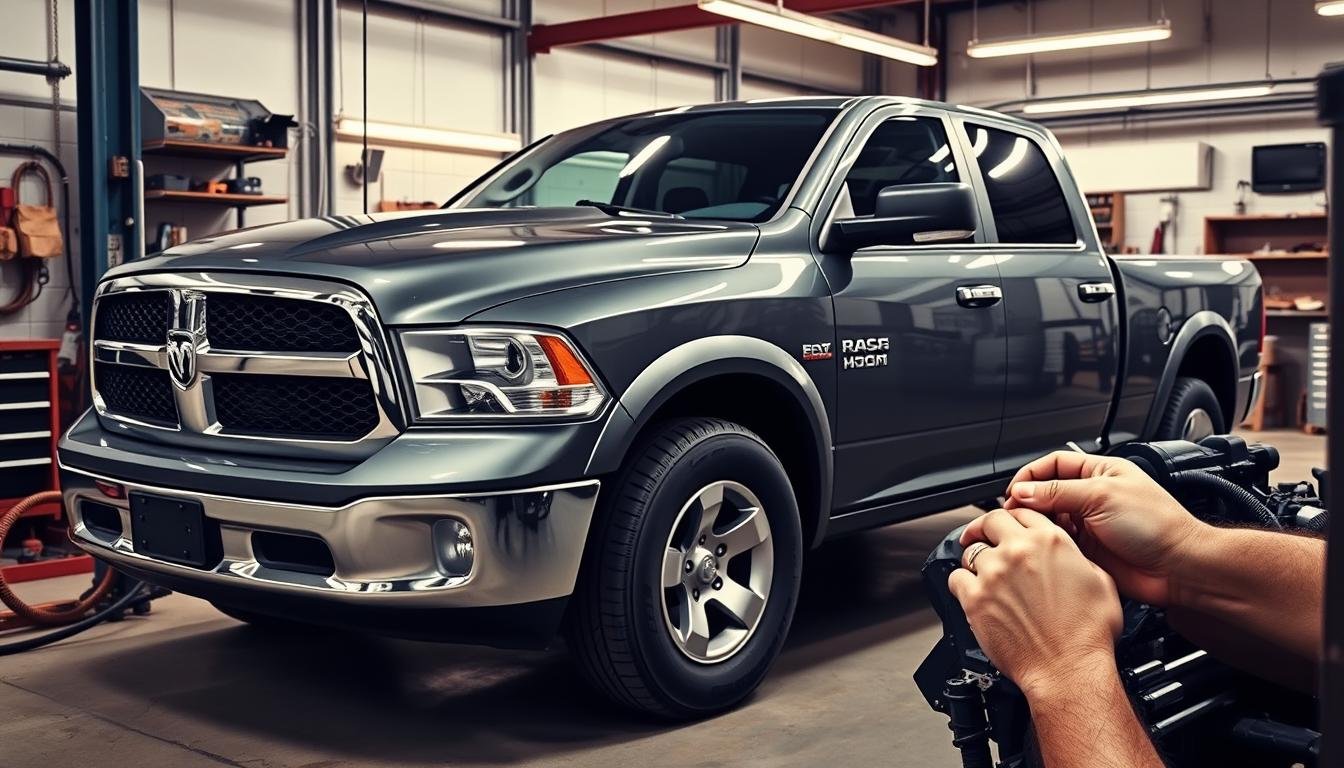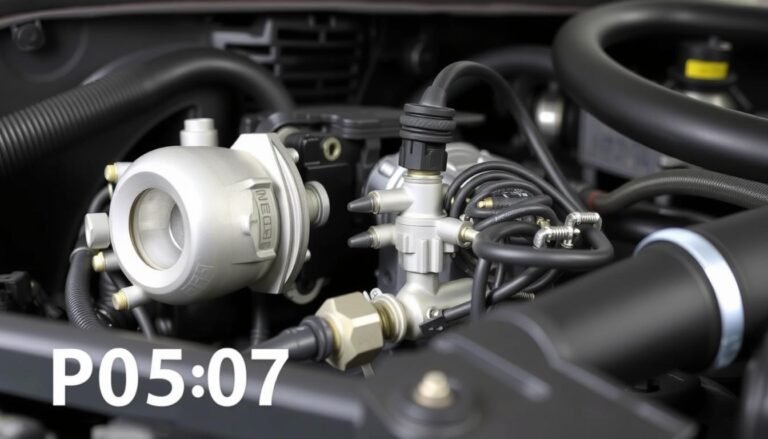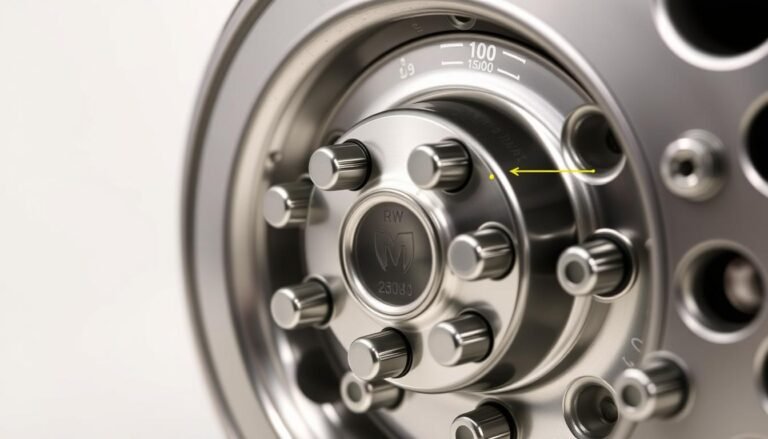Solving P0171 Dodge Ram 1500 Code For – Quick Guide
Want to fix P0171 code on your Dodge Ram 1500? This error comes with signs like black smoke and poor mileage. We’ll show you how to troubleshoot the P0171 error.
Learn about possible causes such as vacuum leaks or bad injectors. We’ll also cover important parts like the mass airflow sensor. Starting is simple. Use an OBD-II scanner to identify the code and related issues.
This step shows if the problem is a vacuum leak, injector issue, or a bad O2 sensor. After finding the cause, we’ll guide you on fixes involving repairs or changing parts.
With this guide, you can confidently maintain your vehicle. Let’s learn more about the P0171 code and fix it!
What is The P0171 Code?
The P0171 code Dodge Ram 1500 highlights a major problem with the vehicle’s air and fuel mix. It means there’s too much air compared to fuel in the engine. When the engine control module (ECM) sees not enough fuel, it tries to fix it by adding more. Knowing what the P0171 code means helps you figure out and fix engine issues.
What Does The P0171 Code Mean?
This code tells you the engine’s air-fuel mix isn’t right. Typical signs include the Check Engine Light turning on, loss of power, or the engine stalling.
Issues like dirty air sensors, blocked fuel filters, leaks, or bad oxygen sensors can cause this problem.
How The System Works
The engine management system keeps an eye on the air-fuel mix for the best engine run. If it’s too lean, the ECM changes the fuel injection to try and fix it. Without correction, this issue can cause misfires.
Too much air might damage the catalytic converter and increase harmful emissions. Understanding these parts helps keep your engine running smoothly.
Symptoms of The P0171 Dodge Ram 1500 Code
Knowing the symptoms of P0171 Dodge Ram 1500 is key to fixing your truck early. This code triggers signs that the air-fuel mix in your engine is off.
Check Engine Light Activation
The Check Engine Light (MIL) coming on is the top sign of the P0171 code. It means the Powertrain Control Module (PCM) found a problem, mostly a too lean air/fuel mix. If you ignore it, things could get worse.
Performance Issues
Performance problems are common with the P0171 Dodge Ram 1500. You might notice your truck is slow to speed up.
Or it could have trouble during regular driving, like making strange noises or rough sounds. This shows the engine isn’t getting enough fuel, raising NOx and hydrocarbons emissions.
Idle Problems
Idle issues often come with the P0171 code too. Your truck might have a hard time idling smoothly, especially when hot or at red lights.
It may seem to stutter or hesitate. This isn’t just annoying; it could also hurt the catalytic converter due to regular misfires.
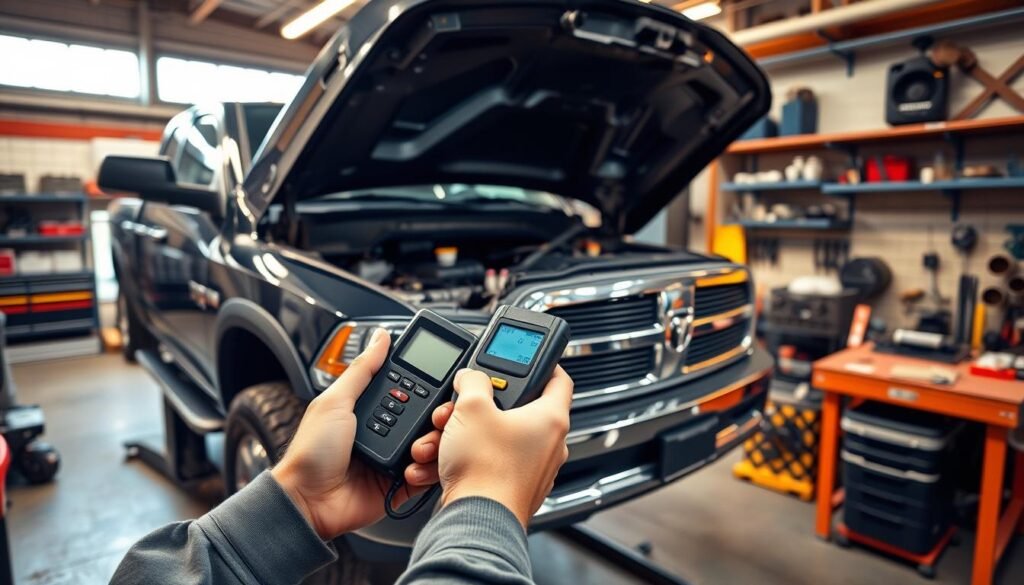
Common Causes of The P0171 Code
The P0171 Dodge Ram 1500 code usually points to air-fuel mixture problems. Knowing the common reasons for the P0171 code helps spot the issue.
Many things can cause this code, mainly linked to how the vehicle balances its air and fuel.
Vacuum Leaks
Vacuum leaks are a top reason for problems with the vehicle’s air-fuel mix. These leaks might happen because of:
- Damaged gaskets or hoses that let in air not measured by the engine’s sensors.
- Cracked or broken vacuum and PCV lines that mess with the air coming in.
- Leaks near the EGR tube and throttle body lead to wrong readings and performance troubles.
Sensor Failures
Sensor failures can badly misreport the air-fuel mix status. Frequent issues with sensors include:
- A dirty or broken Mass Air Flow (MAF) sensor makes the engine run lean.
- A bad oxygen sensor (Bank 1, Sensor 1) sends wrong info to the PCM about air-fuel levels.
- A malfunctioning PCV valve introduces extra air into the engine.
Fuel System Issues
Fuel system problems can set off the P0171 code. Important parts to check are:
- Low fuel pressure due to a failing fuel pump.
- Blocked or dirty fuel filters slow down fuel flow, hurting engine performance.
- Exhaust leaks add too much oxygen before the first O2 sensor, affecting data.
Diagnosing The P0171 Dodge Ram 1500 Code
Start diagnosing the Dodge Ram 1500 P0171 by using an OBD-II scanner. Connect the scanner to the car’s diagnostic port.
It reads the trouble codes from the Engine Control Module (ECM). This finds the P0171 code, which means there’s too little fuel in Bank 1.
Using an OBD-II Scanner
With an OBD-II scanner, focus on the Long Term Fuel Trim values. These values show if the engine is fixing the fuel mix issue. If the values are way off, it could mean vacuum leaks or sensor issues.
Interpreting Diagnostic Data
After using the OBD-II scanner, it’s time to make sense of the data. The P0171 code means the ECM sees a lean mix.
You need to check for a dirty Mass Air Flow (MAF) sensor, leaks, or cracked hoses. Catching these signs early helps in fixing the problem.
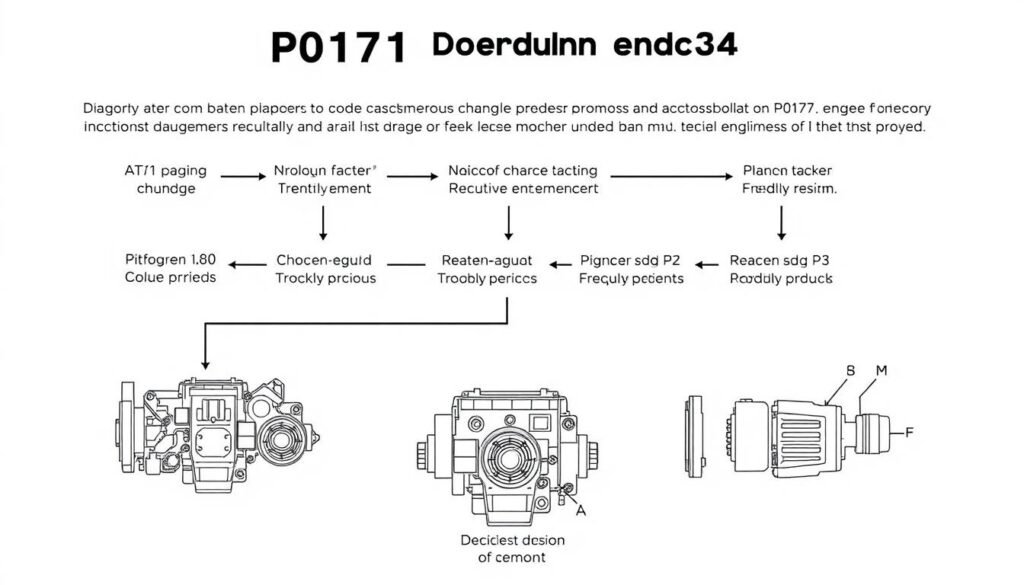
P0171 Dodge Ram 1500 Troubleshooting Steps
Fixing the P0171 code means finding why there’s too much air in the fuel mix. Start by looking for vacuum leaks since they affect the engine’s work.
Use tools to find leaks in hoses and seals. Then, check the fuel system parts, which help keep the mix right.
Checking For Vacuum Leaks
First, check the vacuum lines and gaskets for any damage. Here’s how to make sure you don’t miss anything in the air intake system:
- Measure intake manifold pressure with a vacuum gauge.
- Apply smoke or soapy water at possible leak spots like hoses, gaskets, and seals.
- Watch for bubbles which show there’s a leak.
- Make sure the PCV valve works right and isn’t left open.
Inspecting Fuel System Components
After you deal with vacuum leaks, look at the fuel system parts. These are important for the right fuel flow. Think about these steps:
- Check if the fuel pressure is as it should be.
- See if the fuel filter is blocked, which would limit flow.
- Test the fuel injectors to find if they’re stuck or clogged, leading to a lean mix.
- Inspect the mass airflow and oxygen sensors to ensure they are adjusting the mix correctly.
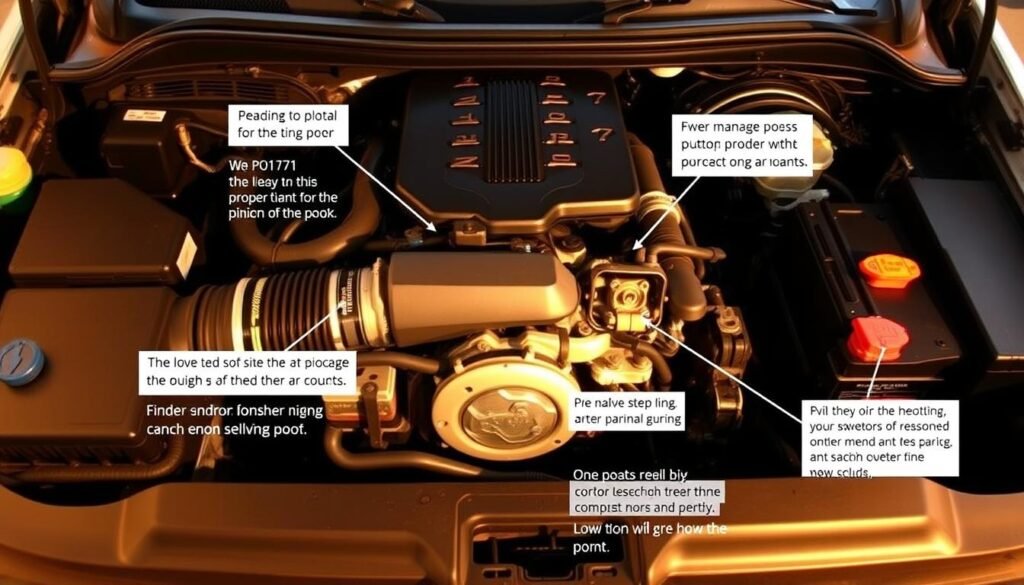
Common Misdiagnosis of P0171 Code
Fixing the P0171 code can get complicated if misdiagnosed. People often blame faulty oxygen sensors right away. But, it’s vital to look closely at the code and symptoms first.
Sometimes, fuel injector problems can look like P0171 issues, causing unneeded replacements.
Faulty Oxygen Sensors
Oxygen sensors are key in managing the air and fuel mix. A P0171 code means there’s not enough fuel compared to air.
Just swapping out oxygen sensors without finding the real issue doesn’t solve the problem. The wrong diagnosis of oxygen sensors leads to spending too much on repairs without fixing the root cause.
Issues with Fuel Injectors
Correctly diagnosing fuel injectors for P0171 is crucial. Yet, mistakes can happen. For instance, a vacuum leak from bad intake gasket seals can seem similar at first.
A smoke machine helps find these leaks which might not be seen during regular checks. Symptoms might only show with a cold engine, showing why detailed checks in different conditions are important.
Wrongly identifying the issue can cause unnecessary replacements of fuel injectors and coils, making repairs expensive.
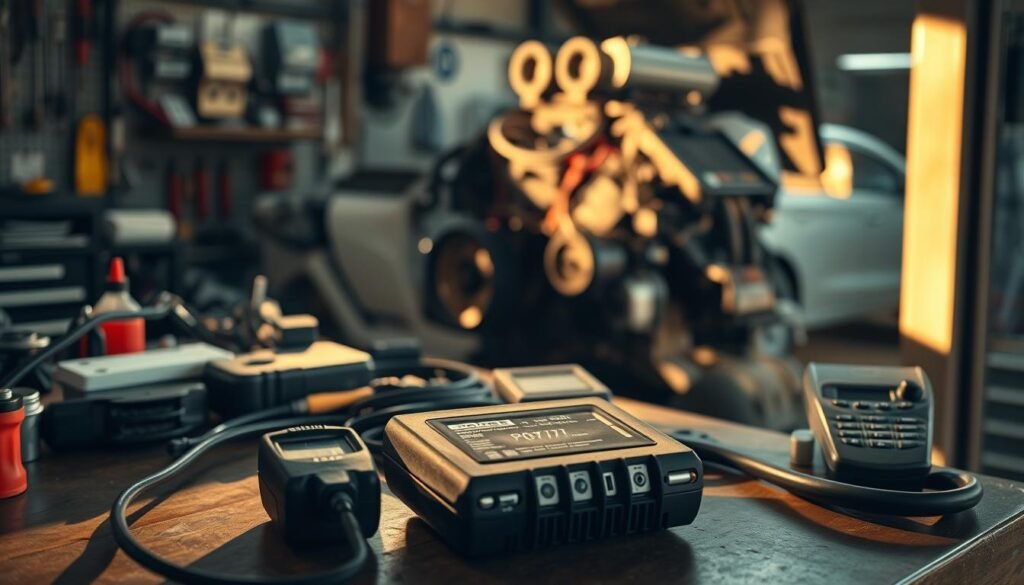
How To Fix P0171 Code Dodge Ram 1500?
Fixing the P0171 code in your Dodge Ram 1500 requires a step-by-step method. Start by finding any underlying issues that cause the P0171 error.
This may include vacuum leaks, faulty sensors, or fuel delivery problems. By troubleshooting and fixing these issues, your vehicle will work properly.
Clearing The Code
After fixing the issues, you must clear the P0171 code. Use an OBD-II scanner to reset the system by following these steps:
- Connect the OBD-II scanner to your vehicle’s diagnostic port.
- Turn on the ignition without starting the engine.
- Access the error codes through the scanner interface.
- Select the option to clear or reset the codes.
- Disconnect the scanner from the vehicle.
Making Necessary Repairs
For the P0171 code, make the needed repairs based on what you find. Common fixes include:
- Repairing or replacing damaged vacuum hoses.
- Replacing faulty mass airflow sensors.
- Fixing any fuel delivery issues, like a blocked fuel filter or a bad fuel pump.
It’s important to monitor the system after repairs. Look out for the check engine light on your dashboard.
This will tell you if the P0171 code comes back. If it doesn’t, you know the repairs worked and the problem is fixed.
P0171 Dodge Ram 1500 Repair Tips
To fix the P0171 code, focus on good maintenance and having the right tools. Good maintenance helps keep your Dodge Ram 1500 running well. The right tools are key for making repairs.
Maintenance Recommendations
Doing regular maintenance stops the P0171 code from coming back. You should:
- Change air filters often to keep air flowing right.
- Look at vacuum hoses for issues that hurt air intake.
- Make sure fuel lines are okay and don’t leak.
- Keep fuel injectors clean to stop cylinder 3 problems and a lean mix.
Tools Needed For Repair
Having the right tools makes fixing the P0171 code more likely. You’ll need:
- An OBD-II scanner for finding and fixing codes.
- A vacuum gauge to find intake system leaks.
- A fuel pressure gauge to check how well the fuel system works.
- Basic tools like wrenches and screwdrivers for replacing parts.
Best Practices For Preventing P0171 Code
To lower the chances of the P0171 code, take proactive steps. Using best practices keeps your Dodge Ram 1500 running well.
It also cuts down on expensive repairs. Paying regular attention to your vehicle helps avoid the P0171 error.
Regular Maintenance Checks
- Perform regular inspections of the mass air flow (MAF) sensor to keep it clean and functioning properly.
- Replace your fuel filter based on the manufacturer’s recommendations to ensure proper fuel flow.
- Check for vacuum leaks regularly and address any issues promptly to maintain optimal performance.
- Inspect and, if necessary, replace oxygen sensors to ensure they are not affecting the air-fuel ratio.
- Monitor the fuel pressure regulator and fuel injectors for issues that could lead to a lean mixture.
- Inspect your fuel supply line for any restrictions that might cause lean conditions.
- Periodically test fuel pressure to ensure it remains within specifications (400 kPa +/- 14 kPa or 58 psi +/- 2 psi).
Importance of Quality Fuel
Using quality fuel is key to steering clear of the P0171 error. Good fuel lessens the buildup of harmful deposits.
Always check the fuel pump inlet strainer and clean it. This ensures strong fuel flow to the engine.
When To Seek Professional Help?
Knowing when to seek professional help for your Dodge Ram 1500 is very important. Sometimes, you can fix minor issues on your own.
But, if the P0171 error code keeps showing up after you’ve tried some easy repairs, it’s time to call in a pro.
Signs That You Need a Mechanic
Watch out for certain signs that you need expert help. If the check engine light stays on, your car has trouble starting, or you notice it hesitates while shifting, these could be signs of bigger problems.
Especially if you see signs of things like catalytic converter failure, you should definitely get a professional to check it out.
- Check engine light remains on after repairs
- Trouble starting the vehicle
- Hesitation when shifting gears
- Persistent performance issues
- Clear evidence of vacuum leaks or sensor failures
Benefits of Professional Diagnostics
There are many benefits to getting professional diagnostics for the P0171 issue. Expert mechanics use high-tech tools and can really understand what the diagnostic data means.
This means they’re great at figuring out exactly what’s wrong, like if it’s an oxygen sensor or something with the powertrain control module.
Going to a certified shop also means you get clear pricing and a warranty for a year or 12,000 miles, which is a big plus.
| Diagnostic Aspect | Professional Mechanic | DIY Approach |
|---|---|---|
| Tools Used | Advanced OBD-II Scanner | Basic OBD-II Scanner |
| Experience Level | Expert Mechanic | Owner’s Knowledge |
| Diagnostic Precision | High | Variable |
| Warranty Offered | 12-month/12,000-mile | None |
Conclusion
Knowing the P0171 code in your Dodge Ram 1500 is key to keeping your truck running well. This code means the fuel mix is too lean, which could be due to many things.
Issues could range from fuel system problems to sensors not working right. With this guide, you’re equipped to find and fix the issue.
You can check things like fuel pressure and make sure the O2 and MAP sensor readings are right. Taking these steps helps you tackle the problem head-on.
It’s important to fix things right when dealing with the P0171 code. If parts like the fuel pump or PCM fail, replace them as tests suggest.
Always run a powertrain test after repairs to make sure everything’s fixed. And remember, safety first – release fuel system pressure before fixing anything.
Regular checks and maintenance on your Dodge Ram will help avoid future troubles. Paying attention to parts like the intake air temperature sensor is a good move.
By using this guide, you’ll keep your truck in top shape and avoid the annoyance of P0171 codes.
FAQs
What should I do when the check engine light activates due to the P0171 code?
First, look at your vehicle’s manual to understand the check engine light. Use an OBD-II scanner to check for the P0171 code. Then, examine your car for vacuum leaks, fuel system issues, and sensor problems.
Can I continue driving my Dodge Ram 1500 with a P0171 code?
You can drive with a P0171 code, but it’s not a good idea. Driving too long with this issue can harm the engine and lower its efficiency. It’s smarter to fix the problem quickly.
How can I identify vacuum leaks in my Dodge Ram 1500?
Use a vacuum gauge to check pressure for vacuum leaks. Also, applying smoke or soapy water around hoses and seals helps. If you see bubbles or smoke while the engine runs, there’s a leak.
How often should I perform maintenance to prevent P0171 code issues?
Maintenance should happen every 3,000 to 5,000 miles. Make sure to change air and fuel filters. Also, check vacuum hoses and fuel lines often. Keeping track of your car’s maintenance helps too.
What tools do I need to troubleshoot the P0171 code?
You’ll need a few things: an OBD-II scanner, a vacuum gauge, and a fuel pressure gauge. Don’t forget your basic hand tools for any repairs.
What common mistakes should I avoid when diagnosing the P0171 code?
Don’t assume it’s the oxygen sensors right away, as the P0171 code suggests a lean mix, not a sensor issue. Make sure fuel injectors are actually faulty before you decide to replace them.
When is it necessary to consult a professional mechanic?
If the check engine light stays on after you’ve tried fixing it, or if the car’s performance drops, see a mechanic. Also, if you’re struggling with electrical issues, a professional has the right tools and knowledge.

